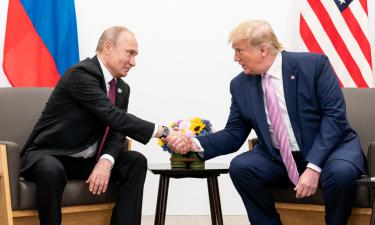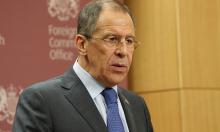Consequences of Iraqi War, As Writers See It
Writers can predict future sometimes
Writers are amazing people. They can guess and even predict the development of these or those events even better that politicians can. There are other people too that are even more amazing than writers – they are politicians, who hardly ever read any books. It seems that American President George W. Bush is one of those politicians. At least, the president did not read the novel “The Fist of God” by Frederick Forsyth. The book is devoted to the events, which took place during the Storm in the Desert operation in 1991.
George W. Bush should have read that book. Probably he would not have made his mistake, if he had read it. In the epilogue, Frederic Forsyth expressed his ideas and conclusions, which were ignored by Western politicians. A lot of his ideas have become actual nowadays. This article also contains a “document,” which might be either a piece of writer’s imagination, or a memorandum that existed in real life.
Any war is supposed to be a lesson. If it does not teach people anything, it means that the battles of that war were wasted as well as those people’s lives, who died in the battles. The war in the Persian Gulf taught us two lessons. The first one of them is the realization of the fact that 30 most industrially developed countries of the world, which had 95% up-to-date high-tech weapons at their disposal, committed an insane action, when they agreed to sell those weapons to an aggressive, dangerous and uncontrollable government.
The government of the republic of Iraq used the lack of foresight of politicians, the stupidity of bureaucrats and the avidity of world’s leading corporations. Iraq set up a giant military mechanism. The profit that was obtained from arms deals paled in comparison with what had to be spent on the destruction of that mechanism. It is possible to prevent from such situations nowadays, having created the international centralized system of control over everything that is exported to potentially dangerous countries. Peculiarities of orders will help specialists to identify, which kind of mass destruction weapons this or that state wants to have. The only alternative is the proliferation of high-tech arms. The Cold War will look like the era of peace and serenity in this case.
The second lesson touches upon the way of collecting the information. When the Cold War was over, a lot of politicians thought that they could put an end to that work. As experience showed, everything was absolutely different. The mankind achieved incredible progress in the 1970s and in the 1980s in the field of the electronic collection of the information. The governments of the countries of the free world came to conclusion that expensive high-tech devices would do all the work for them. People’s role in the collection of information was brought to nothing. All achievements of the Western science and technology were concentrated in the Persian Gulf during the war of 1991. Technological devices were considered immaculate.
Alas, as it turned out, technology was far from being perfect. Iraqi specialists’ skills and the use of free labor force helped to hide the majority of Iraqi weapons under the ground. Allies’ pilots were very professional and courageous, but they were often confused with the way Iraqi servicemen disguised their objects. Biological weapon, poison, A-bomb were never used in the Persian Gulf, but it hardly ever occurs to anyone that we are so close to it at the moment.
By the end of the war it became known that the most ancient way to collecting information – a human being – does not have any alternative for solving certain problems in certain parts of the globe.
US Department of State
USA, Washignton DC, 20520
Memorandum for : James Baker
From: A group of political intelligence and analysis
Subject: Attempted murder of Saddam Hussein
February 5th, 1999
Level of secrecy: Personal
Of course, you are aware of the fact that that there have been at least two attempts made to assassinate Iraqi President Saddam Hussein since the start of the army operation against the Iraqi republic. We made those attempts by means of air raids. In this connection a group of political intelligence and analysis thought it was necessary to predict consequences of a successful attempt on Saddam Hussein’s life. It goes without saying that it would be perfect to destroy the dictatorship of the Baath party and to set up the humane and democratic government under the guidance of the coalition forces.
We believe that such hopes are illusionary. First and foremost, Iraq has never been a joint state. A generation ago the country looked like a bright conglomeration of feuding tribes. The forces of Islamic-Shiite and Sunnite tribes are approximately equal; there are Christian minorities there too. Furthermore, the north of Iraq is also populated with Kurds, who strive for their separation in order to have an independent state of their own.
Secondly, Iraq does not have any experience in establishing a democratic society. This country was first ruled by the Turkish empire, then by the Hashemite monarchy, and then by the Baath party. The people of Iraq failed to become aware of democratic advantages as we know them.
Thus, in case of a sudden completion of the present stage of the Iraqi dictatorship by means of eliminating Saddam Hussein, we can find only two rather real scenarios for further events. There might be an attempt made to set up the government of consent, which would unite all basic factions and movements in a wide coalition. We are certain that the government with such structure will be able to stay at power for a very short period of time. Traditional rivalry and hundreds of years of hostile discrepancy would destroy such a government from within very quickly. Kurds would use such a situation immediately in order to set up their own republic in the north of Iraq. The Baghdad government of consent would not be able to prevent that. It would not be hard to predict the extremely negative reaction of neighboring Turkey. The Kurdish minority that is concentrated on the border territory of Turkey would take its time and unite with Iraqi Kurds. Their opposition to the Turkish dominion would be born again.
The Shiite majority that is based in the south- east of Iraq will definitely find reasons to become reconciled with Tehran. Iran will encourage those attempts in every way, hoping to annex the south-eastern territory of Iraq and to take revenge on Baghdad for the death of thousands of young Iranian people in the recent war between Iran and Iraq. Pro-Western states of the Persian Gulf and Saudi Arabia will be gripped with panic over an opportunity that Iran might approach the Kuwait’s border. Arabs will easily find a common language with their Arab tribe-fellows in Iran, which will eventually lead to tough repression on the part of Iranian leaders. Most likely, we will witness the retrieval of tribal conflicts in Iraq. Tribes will do their best to rule the country.
We believe that the trouble that Yugoslavian nations had to deal with will seem like a childish game in comparison with horror that might take place on the ruins of Iraq. A civil war is possible to happen in the central area of the country, at least four wars might occur on the border territory, which will destabilize the situation in all countries of the Persian Gulf. The number of refugees will be counted in millions.
The only alternative for that is an opportunity of another general or a Baath party figure to take Saddam Hussein’s place. Yet, the reputation of would-be Iraqi leaders is as bloody as the one of Saddam. That is why, any advantages are not likely to happen if one tyrant will be substituted with another. Therefore, it would be best, albeit not perfect, to preserve the current situation in Iraq, having destroyed all kinds of mass destruction weapons there and having decreased the battle power of the Iraqi army in order to minimize a possible danger for every neighboring country.
There can be an objection made that such a decision will result in the fact the Iraqi regime will keep on violating human rights. There are no doubts about that. Nevertheless, the West has witnessed horrible events in China, Russia, Vietnam, Tibet, East Timor, Cambodia, and many other countries. The USA can not force all countries of the world have democratic governments, unless it is going to wage a never-ending global war.
Thus, if Saddam Hussein remains the only ruler of Iraq, the consequences of the Iraqi war will be a lot less catastrophic. Although, Hussein is not supposed to possess the armed forces, which might imperil other countries.
A group of political intelligence and analysis strongly recommends to give up any attempts to remove Saddam Hussein. We also suggest the cessation of further advance towards Baghdad.
Reference: Frederic Forsyth – an English writer, a master of the detective genre of the international scale. He writes political detective novels, some critics consider him the founder of the political thriller genre in literature. Prior to his activity as a writer, Frederic Forsyth was a journalist. He was very good at international journalism and knew a lot about secret services’ activities. The links that he has in all those spheres allow him to obtain interesting information, which makes his books so peculiar against others. His most popular works are: “The Dogs of War,” “The Fist of God,” “The Day of the Jackal,” “The Odessa File.”
Alexander Barinov
Doctor of History
Zabaikal Worker
PRAVDA.Ru
Translated by Dmitry Sudakov
Subscribe to Pravda.Ru Telegram channel, Facebook, RSS!






